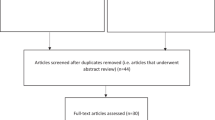Abstract
Because refugees can experience crisis, bereavement, and traumatization, there has been a rapid increase of research carried out with refugees. This study investigated how refugee families respond to participation in research. A previous study explored how adults and children had communicated about the difficult question of repatriation after arriving in a new country. Did the in-depth interviews harm or benefit them? Are there any ethical risks in research on traumatized refugees? From an original sample of 74 Bosnian refugees (5–73 years), 30 family members from 9 families including 14 children aged 6 to 19, were re-interviewed. The refugees rated participation as positive. A few parents lacked information that could have enabled them to inform the children better before the interviews. The study shows that studies on traumatized/bereaved populations can have beneficial effects.
Similar content being viewed by others
References
Balk, D. E. (1983). Adolescents' grief reactions and self-concept perceptions following sibling grief: A study of 33 teenagers. Journal of Youth and Adolescence, 12, 137–161.
Barthels, S. J. (1987). The aftermath of suicide on the psychiatric inpatient unit. General Hospital Psychiatry, 9, 189–197.
Beskow, J., Runeson, B., & Åsgård, U. (1991). Psychological autopsies: Methods and ethics. Suicide and Life Threatening Behaviour, 20, 307–323.
Brent, D. A. (1989). The psychological autopsy: Methodological considerations for the study of adolescent suicide. Suicide and Life Threatening Behaviour, 19, 43–57.
Briggs, C. L. (1986). Learning how to ask. A sociolinguistic appraisal of the role of the interview in social science research. New York: Cambridge University Press.
Ceci, S. J., Peters, D., & Plotkin, J. (1985). Human subjects review, personal values, and the regulation of social science research. American Psychologist, 40, 994–1002.
Cook, A. S. (1995). Ethical issues in bereavement research: An overview. Death Studies, 19, 153–122.
Cook, A. S.,& Bosley, G. M. (1995). The experience of participating in bereavement research: Stressful or therapeutic? Death studies, 19, 157–170.
Denzin, N. (1989). Interpretive biography. London: Sage.
Dickens, B. M. (1981). Ethical issues in psychiatric research. Journal of Law and Psychiatry, 4, 271–292.
Dyregrov, A., & Dyregrov, K. (1999). Long-term impact of sudden infant death: A twelve to fifteen year follow-up. Death Studies, 23, 635–661.
Dyregrov, A., Gupta, L., Gjestad, R., & Raundalen, M. (1996). Is the culture always right? Paper presented at the 12th Annual Meeting of the International Society for Traumatic Stress Studies, San Francisco, November 9–13.
Dyregrov, K.,& Raundalen, M. (1997). Hvordan kommuniseres hjemvendingsspørsmålet i den bosniske familien. Fokus på barn og unges rolle. Rapport. Senter for Krisepsykologi. Kommunal og Regionaldepartementet. Norge.
Favaro, A., Maiorani, M., Colobo, G., & Santonaastaso, P. (1999).Traumatic experiences, posttraumatic stress disorder, and dissociative symptoms in a group of refugees from former Yugoslavia. The Journal of Nervous and Mental Disease, 187, 306–308.
Fuller, K. L. (1993). Refugee mental health in Aalborg, Denmark. Traumatic stress and cross-cultural treatment issues. Nordic Journal of Psychiatry, 47, 251–256.
Hundeide, K. (1995). A critical note: Balancing trauma therapy with some realities. Linjer, 1–2, 12–14. (Magazine Published by the Psychosocial Center for Refugees. Oslo, Norway.)
Knudsen, J. C. (1992). ChickenWings. Refugee stories from a concrete hell. Bergen: Magnat Forlag.
Kvale, S. (1996). InterViews. An introduction to qualitative research interviewing. London: Sage.
Lehman, D. R., Ellard, J. H., & Wortman, C. B. (1986). Social support for the bereaved: Recipients' and providers' perspectives on what is helpful. Journal of Consulting and Clinical Psychology, 54, 438–446.
Macklin, R. (1978). Case studies in bioethics: Studying grief without consent-Commentary. Hastings Center Report, 9, 22.
McNiel, D. E., Hatcher, C., & Reubin, R. (1988). Family survivors of suicide and accidental death: Consequences for widows. Suicide and Life Threatening Behaviour, 18, 137–148.
Mishler, E. G. (1986). Research interviewing. Context and narrative. Harvard: Harvard University Press.
Nader, K., & Pynoos, R. S. (1991). Play and drawing as tools for interviewing traumatized children. In Schaefer, C. E., Gitlin, K., & Sandgrund (Eds.), Play, Diagnosis and assessment. New York: John Wiley.
Parkes, C. M. (1988). Bereavement as a psychosocial transition: Processes of adaptation to change. Journal of Social Issues, 44, 53–65.
Pennebaker, J. W. (1990). Opening up. The healing power of confiding in others. New York: William Morrow and company.
Pennebaker, J. W. (1993). Putting stress into words: Health, linguistic, and therapeutic implications. Behavior Research and Therapy, 31, 539–548.
Pennebaker, J.W. (1997). Opening up. The healing power of expressing emotions. New York: Guilford Press.
Pynoos, R. S., & Nader, K. (1993). International handbook of Traumatic Stress Syndromes. New York: Plenum Press.
Raundalen, M., & Dyregrov, K. (1998). How to communicate about repatriation: Advising parents of refugee children. Center for Crisis Psychology. Bergen. Norway. In collaboration with ministry of Local Government and Regional Development. Oslo.
Riches, G., & Dawson, P. (1996). Making stories and taking stories: Methodological reflections on researching grief and marital tension following the death of a child. British Journal of Guidance and Counselling, 24, 3.
Runeson, B., & Beskow, J. (1991). Reactions of survivors of suicide victims to interviews. Acta Psychiatrica Scandinavia, 83, 169–173.
Tedeschi, R. G., & Calhoun, L. G. (1995). Trauma and Transformation. London: Sage.
Thulesius, H., & Håkansson, A. (1999). Screening of posttraumatic stress disorder symptoms among Bosnian refugees. Journal of Traumatic Stress, 12, 167–174.
Weine, S. M., Vojvoda, D., Becker, D. F., McGlashan, T. H., Hodzic, E., Laub, D., Hyman, L., Sawyer, M., & Lazrove, S. (1998). PTSD symptoms in Bosnian refugees 1 year after resettlement in the United States. American Journal of Psychiatry, 155, 562–564.
Worden, J. W. (1982). Grief counselling and grief therapy: A handbook for the mental health practitioner. New York: Springer.
Author information
Authors and Affiliations
About this article
Cite this article
Dyregrov, K., Dyregrov, A. & Raundalen, M. Refugee Families' Experience of Research Participation. J Trauma Stress 13, 413–426 (2000). https://doi.org/10.1023/A:1007777006605
Issue Date:
DOI: https://doi.org/10.1023/A:1007777006605




